Puns in Romeo and Juliet Act 1 set the stage for this enthralling narrative, offering readers a glimpse into a story that is rich in detail and brimming with originality from the outset. These clever plays on words serve as a comedic foil to the play’s tragic undertones, adding depth and dimension to the characters and their motivations.
Throughout Act 1, Shakespeare employs puns to foreshadow events, develop character relationships, and provide comic relief. By examining these puns, we gain a deeper understanding of the play’s themes and the complex world in which its characters reside.
Introduction
Romeo and Juliet Act 1 sets the stage for the tragic love story of two young lovers from feuding families. This act is crucial as it establishes the characters, their motivations, and the conflict that drives the plot.
One notable feature of Act 1 is the use of puns, which play a significant role in conveying the play’s themes and character development.
Examples of Puns in Romeo and Juliet Act 1
Puns are a form of wordplay that uses the multiple meanings of words to create humor. Shakespeare frequently employed puns in his plays, and Romeo and Juliet is no exception. Act 1 of the play contains several examples of puns that add wit and humor to the dialogue.
One of the most famous puns in the play occurs in the opening scene, when Romeo laments his unrequited love for Rosaline. He says, “Is she a Capulet? O dear account! My life is my foe’s debt.” The pun here lies in the word “account.”
It can mean both a financial debt and a reckoning or judgment. Romeo is saying that his love for Rosaline is both a debt that he owes to her and a judgment that he must pay for.
Another pun occurs in Scene 2, when Romeo and Juliet first meet at the Capulet’s ball. Romeo says to Juliet, “Did my heart love till now? For I ne’er saw true beauty till this night.” The pun here lies in the word “heart.”
It can mean both the physical organ and the seat of emotions. Romeo is saying that he has never truly loved before because he has never seen true beauty until he met Juliet.
These are just two examples of the many puns that can be found in Romeo and Juliet Act 1. These puns add wit and humor to the play, and they help to create a more lively and engaging atmosphere.
Additional Examples
- In Scene 1, Mercutio says, “If love be rough with you, be rough with love.” The pun here lies in the word “rough.” It can mean both physically rough and emotionally rough. Mercutio is saying that if love is treating you badly, you should treat love badly in return.
In Romeo and Juliet Act 1, puns abound, such as when Mercutio quips about “a pump” as a leg, foreshadowing the “pump” in the legal case Union Pump Co. v. Allbritton . Despite the tragic events that unfold, the play’s wordplay adds a touch of humor.
Even in the face of star-crossed love and bitter feuds, puns serve as a reminder that language can be both playful and poignant.
- In Scene 3, the Nurse says, “I am a peevish sheep.” The pun here lies in the word “sheep.” It can mean both a literal sheep and a foolish or silly person. The Nurse is saying that she is a foolish or silly person.
- In Scene 5, Romeo says, “I have bought the mansion of a love, but not possessed it.” The pun here lies in the word “mansion.” It can mean both a literal mansion and a figurative mansion. Romeo is saying that he has bought the love of a woman, but he has not yet possessed her physically.
Types of Puns in Romeo and Juliet Act 1
Puns in Romeo and Juliet Act 1 can be categorized into different types based on their linguistic structure and wordplay techniques. Here are some common types of puns found in the play:
Homonyms
Homonyms are words that have the same spelling and pronunciation but different meanings. Puns based on homonyms often involve playing on the multiple meanings of a single word.
- Example:“If you wish to see the moon, you have to wait for the night. But if you wish to see the sun, you have to wait for the day.” (Act 1, Scene 1)
Homophones
Homophones are words that sound the same but have different spellings and meanings. Puns based on homophones create humor by exploiting the similarity in sound between different words.
- Example:“A rose by any other word would smell as sweet.” (Act 1, Scene 2)
Puns Based on Ambiguity
These puns rely on the ambiguity of a word or phrase, where it can be interpreted in multiple ways. The humor arises from the confusion created by the multiple interpretations.
- Example:“I have lost myself. I am not here.” (Act 1, Scene 1)
Puns Based on Context
These puns depend on the context of the situation or conversation to create humor. The pun may not be immediately apparent without understanding the context.
- Example:“I am too sore in ears with your love-sonnets.” (Act 1, Scene 1)
Visual Puns
Visual puns are based on the visual representation of words or phrases. They often involve using spelling or typography to create a humorous effect.
- Example:“A plague on both your houses!” (Act 1, Scene 1)
Purpose and Effect of Puns in Romeo and Juliet Act 1
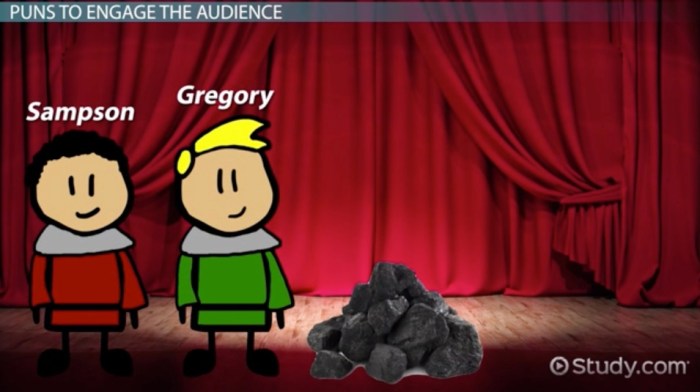
The use of puns in Romeo and Juliet Act 1 serves several purposes. Firstly, they add a layer of humor to the play, providing comic relief amidst the tragic events. This humor helps to lighten the mood and make the play more enjoyable for the audience.
Secondly, puns contribute to the play’s themes. For example, the pun on “star-crossed lovers” in the prologue foreshadows the tragic fate of Romeo and Juliet. Additionally, the puns on “light” and “dark” reflect the play’s exploration of the contrast between love and hate.
Finally, puns help to develop the characters. For instance, Romeo’s puns reveal his wit and intelligence, while Mercutio’s puns show his mischievous and playful nature. These puns provide insight into the characters’ personalities and motivations.
Contribution to Plot
Puns also contribute to the play’s plot. For example, the pun on “fair” in the balcony scene leads to Romeo and Juliet’s first kiss. Additionally, the pun on “grave” in the tomb scene foreshadows Romeo’s death.
Puns and Characterization in Romeo and Juliet Act 1
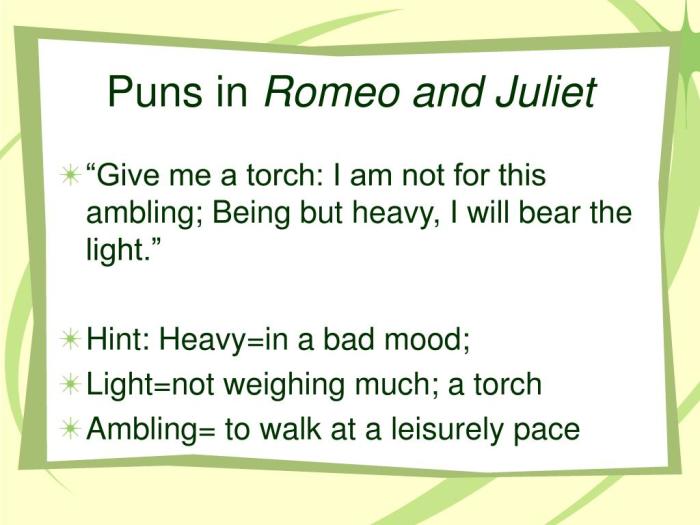
Puns play a significant role in characterizing the individuals in Romeo and Juliet Act 1. They reveal the characters’ personalities, relationships, and the atmosphere of the play.
Shakespeare employs puns to depict the wit and intelligence of certain characters, particularly Romeo and Mercutio. For instance, Romeo’s pun on his name, “I am but fortune’s fool,” suggests his pessimistic and fatalistic nature.
Mercutio’s Use of Puns
Mercutio’s use of puns highlights his playful and sarcastic nature. His pun on the word “consort,” where he refers to Romeo as “consort” both in the sense of a companion and a musical instrument, demonstrates his mischievous humor.
Puns and the Atmosphere of the Play, Puns in romeo and juliet act 1
Puns also contribute to the overall atmosphere of the play. The frequent use of puns in Act 1 creates a sense of lightheartedness and humor, contrasting with the tragic events that unfold later in the play.
Conclusion
In conclusion, puns are an integral part of Romeo and Juliet Act 1, serving to develop and characterize the individuals, enhance the atmosphere, and provide comic relief.
Puns and Foreshadowing in Romeo and Juliet Act 1
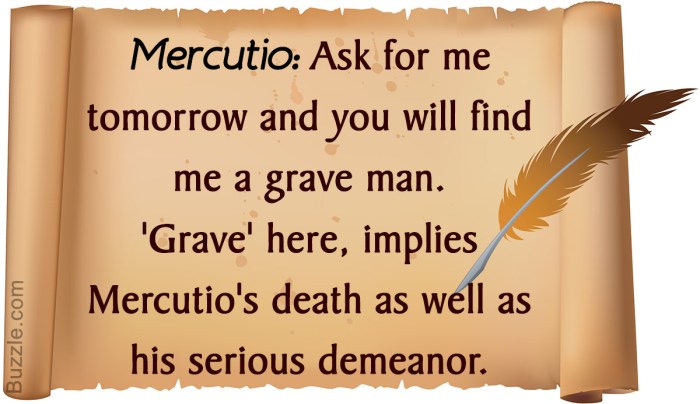
Puns in Romeo and Juliet Act 1 serve as clever wordplay that foreshadows significant events and themes in the play.
For instance, Romeo’s line, “Did my heart love till now? For I ne’er saw true beauty till this night,” hints at his future infatuation with Juliet. This pun on “heart” and “beauty” foreshadows Romeo’s love at first sight and his eventual tragic fate.
Romeo’s Wordplay
- “I fear, too early: for my mind misgives / Some consequence yet hanging in the stars”foreshadows the ill-fated outcome of the play.
- “Is she a Capulet? O dear account! / My life is my foe’s debt”puns on “account” and “debt” to foreshadow Romeo’s love for Juliet despite their feuding families.
Tybalt’s Puns
- “Well, peace be with you, sir: here comes my man”puns on “peace” and “man” to foreshadow the impending fight between Tybalt and Mercutio.
Puns and Comic Relief in Romeo and Juliet Act 1: Puns In Romeo And Juliet Act 1
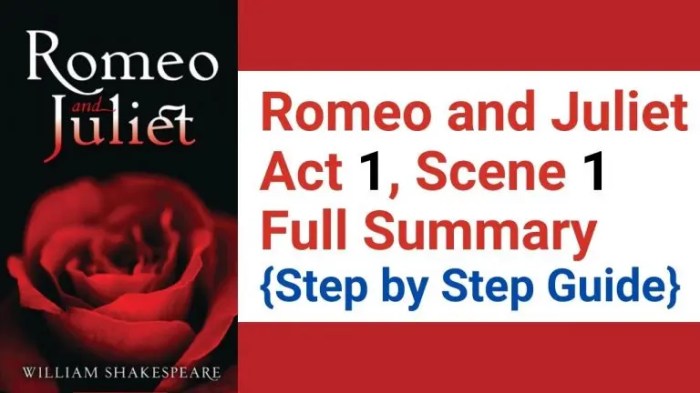
In Romeo and Juliet Act 1, puns serve as a means of providing comic relief amidst the play’s tragic events. These puns lighten the mood and add a touch of humor, offering a brief respite from the heavy themes of love, loss, and conflict.
Puns that Lighten the Mood
- When Romeo asks Benvolio to describe Rosaline’s beauty, Benvolio replies, “Compare her face to some that I have seen, / And you will swear the deep-sea swell’d her chin.” This pun on “chin” and “sin” creates a humorous image, momentarily diverting attention from Romeo’s heartache.
- As the Montagues and Capulets engage in a street brawl, Gregory exclaims, “No, ’tis not so well, there’s too much hands in it.” This pun on “hands” and “ends” adds a comical element to the otherwise violent scene.
Conclusion
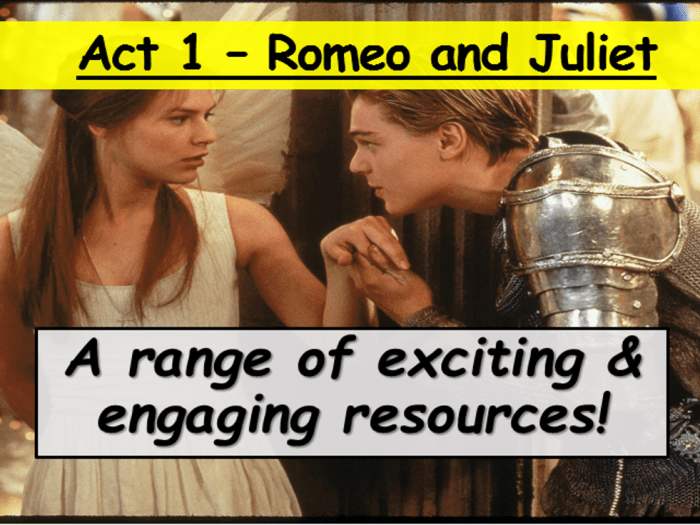
In conclusion, puns in Act 1 of Romeo and Juliet play a significant role in establishing the tone, characterization, and foreshadowing of the play.
The use of puns adds a layer of wit and humor to the otherwise tragic story, creating a contrast that highlights the characters’ immaturity and the play’s themes of love, fate, and conflict.
FAQs
What is the significance of puns in Romeo and Juliet Act 1?
Puns in Act 1 serve multiple purposes, including foreshadowing, character development, and comic relief.
How do puns contribute to characterization in the play?
Puns reveal character traits, relationships, and motivations, adding depth and complexity to the characters.
Can you provide an example of a pun in Romeo and Juliet Act 1?
In the prologue, the Chorus refers to the play as a “star-crossed lovers” story, using a pun on the word “crossed” to suggest both the lovers’ tragic fate and the intersecting paths of their families.